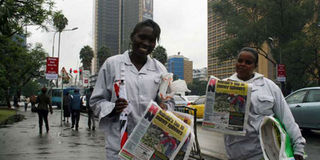So-called English experts should pack it in for misleading readers

Vendors copies of the Nairobi News newspaper along Kenyatta Avenue in Nairobi on November 20, 2013. PHOTO | WILLIAM OERI | NATION MEDIA GROUP
What you need to know:
- Quite surely, the verb to pack exists.
- Any dictionary will tell you that, here, to pack is not the verb the Standard subeditor was looking for.
What is to “pack”? I culled that verb from a page-one headline in The Standard of June 14: “IEBC is ready to pack and go, says Hassan”. Here, clearly, the controverted election chief is not the culprit. Though I am not a fan of his, I know he is not the official in charge of the Nairobi newspaper’s headlines.
Quite surely, the verb to pack exists. But any dictionary will tell you that, here, to pack is not the verb the subeditor was looking for. What he or she wanted is the verb to pack up. In short, whenever the verb to pack is accompanied by the preposition up, its meaning changes drastically.
As The Standard’s own English language “expert” recently told Kenyans, to pack up is a phrasal verb, meaning to arrange certain bodily necessities, like clothing, in a container ready for a journey. But up is not the only preposition you can juxtapose to that verb.
In is another. To pack in is to stop something you were doing – as one might advise The Standard’s columnist to pack it in with regard to his make-believe concerning English. In medicine, say, a person who falsely calls himself an expert is a quack. A court judge might condemn his activities tautologically as “false pretences”.
A quack is an unqualified person who, nevertheless, struts all over the place like a tausi, making the loudest claims to expertise, especially in medicine. But, in any field, whenever a person makes that a habit, he or she poses terrible dangers to society and thus invites official intervention to stop him or her from inflicting any further damage to the social mind.
In short, what Mr Hassan might have said was that, after so many years of battering by the opposition parties, he and other officials of the Independent Electoral and Boundaries Commission (IEBC) now felt so beleaguered as to want to pack it in, to throw in the towel, to call it a day, to give in.
That would have been a banner-headline story coming from officials of a significant state instrument in a country where the word resignation is never part of the vocabulary of officials – even after their names (singly or collectively) have been horribly soiled. No, to soil a name is not to prove the owner guilty.
But the IEBC has been controverted for so long that any amount of moral qualm would have compelled members (singly or collectively) to voluntarily step down. No, I have not presided over any inquiry into their conduct. So I do not know that they are guilty.
What I know is only that they have been undermined for so long that no party (except the ruling coalition) has any more faith in them. That does not make them guilty. But, among a morally conscious group, any mere knowledge that a good section of the nation wholly rejects your claims to objectivity and disinterest would long ago have forced you to throw in the towel.





